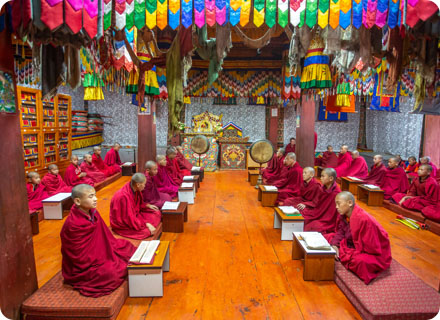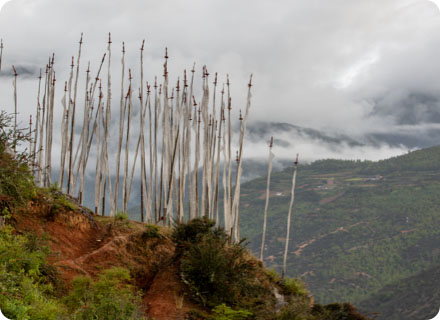Good to know about Bhutan
Government regulations & visa
Bhutan holds a unique tourism policy of 'High-value, Low-volume', preventing mass tourism and protecting the pristine environment of the Kingdom. As a consequence, visitors to Bhutan need to comply with several regulations: most visitors have to apply for a visa or travel permit ( wwww.visit.doi.gov.bt ) and all visitors have to pay the mandatory Sustainable Development Fee (SDF). The SDF is levied by the Government of Bhutan and is used to upgrade infrastructure and services, elevate tourists’ experiences, and maintain carbon-neutral tourism. The SDF is US$100 per person per night and is paid to the Bhutanese Government and is paid during the visa processing (not applicable to Indian passport holders).
Health
Bhutan is a country of high altitude, which might trigger symptoms of altitude sickness, such as headaches, dizziness, intense tiredness and general decreased physical productivity. Therefore, regardless your age and physical condition, it is important to take good care of your body, allowing yourself to gradually adjust to the heightand smaller quantities of oxygen.
What to Pack
We always recommend our guests that clothing be layered so that you can adapt to the changing conditions. To visit religious or sacred sites, the Department of Cultural Affairs advises to dress/behave respectfully. Therefore, werecommend that you wear long trousers or skirts and a top with sleeves. In the colder months (November-February), it is recommended to bring a pair of thick socks to wear inside the temples as floors can be really cold. For hiking, a warm jacket, good leather or waterproof boots or shoes with good soles, waterproof jacket, sunglasses, warm hat, sunhat, sunscreen, lip protection and a day-pack to carry your essentials are needed.
Currency
The Bhutanese unit of currency is the Ngultrum (Nu), which is pegged to the value of the Indian Rupee.
Electricity
The power points are usually fitted with multi plugs at 220 Volts AC.
Language
Dzongkha is Bhutan’s official language. There are over 20 languages spoken in the Kingdom. English is widely used within the community and business.
Time
Local time is 6 hours ahead of Greenwich Mean Time (GMT), 30 minutes ahead of India, 1 hour behind Thailand and 2 hours behind Singapore.
Vaccinations
There are no specific vaccinations required when travelling to Bhutan, unless you are arriving from an area designated as infected by cholera or yellow fever. In this case, make sure to bring with you your vaccination card.
Weather
Bhutan is a year-round destination with four seasons, all beautiful: Spring (March-May): warm, dry and sunny. Summer (June-August): the “Green Season” with its blooming flowers and birdlife, with chance of rain, usually in the afternoon/evening. Autumn (September-November): warm, dry and sunny. Winter (December-February): sunny days, cold dry nights and amazing mountains views.



